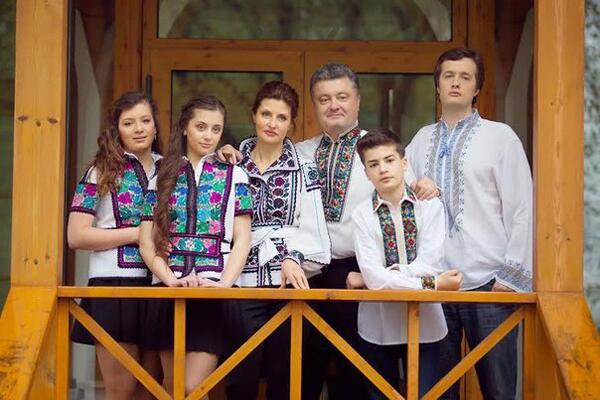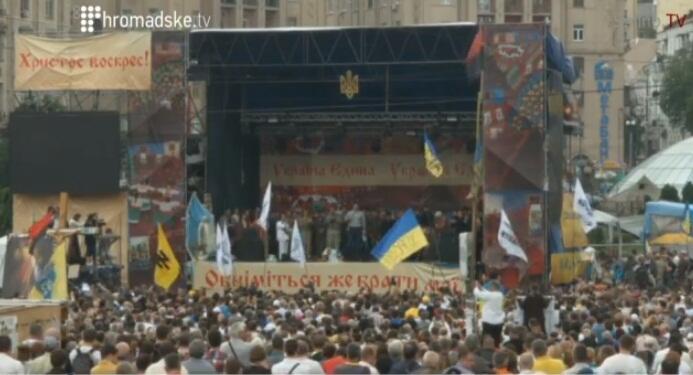A two-tone election
Soldiers carry the coffin of Major General Sergei Kulchytsky, Commander of the military unit and Deputy Chief of the Western Territorial Command of Internal Troops, during a funeral ceremony in the western Ukrainian city of Lviv on May 31, 2014. Kulchytsky and 12 other Ukrainian soldiers were killed as their helicopter was downed by pro-Russian militants on May 29, 2014 during an operation near the eastern Ukrainian city of Slavyansk, in the Donetsk region.
“AS I set off on a spring journey into the world, my mother embroidered my shirt with two colours: red for love and black for sorrow,” goes a popular Ukrainian song. On May 25th, as Ukrainians went to the polls to elect Petro Poroshenko as their new president, many sported the traditional shirts embroidered with red and black threads. Held in the middle of a war stoked by Russia’s Vladimir Putin, and three months after a revolution in Kiev’s Maidan that led to more than 100 deaths—and cost the country Crimea, which Mr Putin annexed—Ukraine’s presidential election was an act of defiance as much as an expression of political preferences.
The sense of nationhood that emerged from the Maidan revolution produced long queues at the polling booths. “We are not just choosing a new president. We are choosing a new country, where everything depends on us,” said Oksana Selezneva, a 24-year-old IT specialist. The energy of voters was directed externally as much as within. As one put it, “Every vote cast is a slap in the face for Mr Putin.” The goal was to show that Ukraine could function as a nation-state. The terror unleashed by separatists in the eastern industrial Donbas region aimed to demonstrate the opposite. Yet, by thwarting the vote in most of their region, separatists also boosted the figures for Mr Poroshenko, enabling him to win in the first round and sparing the country three weeks of uncertainty.
Mr Poroshenko’s success was in part a recognition of his active role in the Maidan. But it also reflected a longing to return to normal life. Mr Poroshenko’s line of business (chocolates and cakes) and his previous experience in the government as foreign minister and finance minister made him, in the eyes of most of the population, a leader who could take Ukraine to peace, not war. During his campaign he exuded confidence and leadership. Unlike the previous two presidents, Mr Poroshenko represents the centre of the country, not the east or the west.

President-elect Petro Poroshenko with his family in national costumes
In his first news conference as president, Mr Poroshenko pledged to win the trust of peaceful people in the Donbas and crack down on terrorists in hours, not months. His first trip, he said, would be to the Donbas. Yet, even as the votes were being counted, the region erupted in the worst violence since the troubles began. An attempt by armed rebels to seize a newly built international airport in Donetsk produced a swift response from Ukrainian forces, who killed as many as 50 rebels—several of them Russian citizens. Rebels then shot down a helicopter, killing 14 people, including a general.

Members of the Ukrainian army inspect an area near Slovyansk, Ukraine, Friday, May 30, 2014.
With an assortment of mercenaries and irregulars, apparently including some from Chechnya and Dagestan in Russia’s north Caucasus, fighting alongside the separatists, the conflict risks spiralling into a long and messy war. The big threat to Ukraine is not that the Donbas will split off or be annexed by Russia, but that it will draw in the rest of the country and distract political leaders, including Mr Poroshenko, from building a new, functioning state. Ukraine also needs to move closer to Europe and recreate its entire political system, one of the main demands of the Maidan. If the government in Kiev fails to deliver on expectations, it may only be a matter of time before western Ukraine, next door to Poland, begins to get restless.
 Kyiv, June 1st 2014, Crowd at the Viche are very angry beacuse many people are dying at Eastern Ukraine, Mayor-elect Klytchko is trying explain situation.
Kyiv, June 1st 2014, Crowd at the Viche are very angry beacuse many people are dying at Eastern Ukraine, Mayor-elect Klytchko is trying explain situation.
The election has changed the political landscape. Yulia Tymoshenko, the veteran Orange revolutionary princess, won just 13% of the vote. Two far-right nationalist leaders, the mainstay of Russian propaganda, barely got 2% between them. Rinat Akhmetov, the richest man in Ukraine, who controls much of the Donbas, lost his almost magic power. His concern is now to save himself and his business from the chaotic fighting in his fief rather than to demand more concessions from Kiev.
The parliament itself has been invalidated by the election. Not only does it bear political responsibility for much of the violence against the Maidan protesters in February, but it also does not represent anyone other than the oligarchs who buy seats in it. The candidate for the Party of Regions, which was a dominant force in parliament under Mr Yanukovych, got just 3% of the vote in the presidential election.
Mr Poroshenko has called a general election in the autumn. A new parliament will almost certainly be dominated by a centrist coalition that will represent him and his political allies. But the question is whether he can use his legitimacy to modernise and reform his country. Mr Poroshenko ran his campaign under the slogan “A new way of living”. Yet his victory was as much a result of an alliance between powerful elite groups as of popular hopes for renewal.
 Presidential candidate Petro Poroshenko and Vitali Klitschko congratulate each other during a press conference in Kiev after exit polls were announced
Presidential candidate Petro Poroshenko and Vitali Klitschko congratulate each other during a press conference in Kiev after exit polls were announced
His coalition with Vitaly Klitschko, the former boxing champion who bestrode the Maidan but withdrew from the presidential contest in Mr Poroshenko’s favour, opting instead for the job of Kiev’s mayor, was part of a deal with Mr Klitschko’s backers. These include Sergei Levochkin, a former chief of staff of Mr Yanukovych, and his business partner, Dmitry Firtash, a powerful Ukrainian oligarch who has been charged by America with bribery.
Mr Poroshenko has no team of his own, so he may have to turn to new political partners. He has pledged to fight corruption, but this means turning oligarchs into ordinary businessmen, killing their lucrative monopolies and making them pay taxes. Yet in the past three months Kiev has relied on some of these same oligarchs, particularly on Mr Akhmetov and Igor Kolomoisky, owner of one of the country’s largest private banks and governor of Dnipropetrovsk, to keep the country together.
Even some of Mr Poroshenko’s allies say the best he can do in these circumstances is to stop Ukraine sliding into an abyss rather than try to reform it. Mr Poroshenko is unlikely to see his presidency as a route to personal enrichment, which would mark a big improvement to previous governments. Economic reforms and less corruption could make Ukraine more attractive to investors. Yet what the country needs most is new governance. “We haven’t got time for mere improvements to the old system, we need to build a new one,” says Yulia Mostovaya, editor of Zerkalo Nedeli, a magazine.
Ukraine has a dismal record of missing historic opportunities. It has done little with the independence it received almost by default when the Soviet Union collapsed in 1991. It wasted the chances created by the Orange revolution. It can ill afford to mark time again.


No comments:
Post a Comment